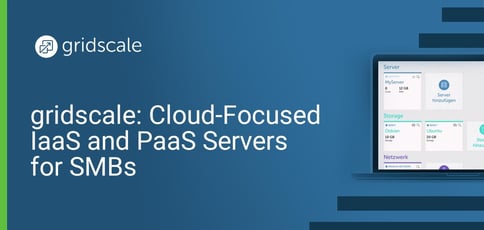
TL; DR: The cloud-hosting revolution has progressed unevenly for small businesses, which is why gridscale emerged to focus on the needs of SMBs. The host offers transparent pricing, granular server resource allocations, and a full suite of cloud-focused networking technologies. That comprehensive approach helps small businesses move to the cloud with more efficiency than with one-size-fits-all solutions. Next up, gridscale plans to expand its international presence and grow its Hybrid Core platform solution.
The cloud hosting market has been around since the early 2000s, but many providers didn’t offer practical solutions for small businesses early on. Hosting plans were often rigid and didn’t include the flexibility that many entrepreneurs needed.
That was still the case when gridscale entered the market in 2014.
“When we launched gridscale, cloud providers were already part of the market,” said Henrik Hasenkamp, gridscale CEO. “The problem at the time was that most of them offered standardized solutions with little to no possibility for adaptation to individual requirements.”

For gridscale, the inflexibility of dominant market players presented an opportunity to serve a growing segment within the industry. Instead of offering a one-size-fits-all solution, gridscale emphasized precision — not just in cloud-computing technologies and configurations but also in its per-server resource allocation and pricing model.
“We wanted to pave the way for medium-sized companies into a new era of IT scaling,” he said. “Our customers only pay for the resources they use, which makes it much easier for smaller companies to justify the implementation of the cloud.”
gridscale delivers a full range of products, including cloud servers, managed servers, and virtual private networks. It also supports resellers and a marketplace of easy-to-deploy apps for its servers.
The gridscale pricing model relies on user-selected server configurations, not stock SKUs. While creating a new server, clients can quickly customize their storage and public addresses. Each configuration is dynamically priced as the inputs change, so customers only pay for what they need.
And unlike many other providers, gridscale doesn’t charge when the server isn’t running.
An Emphasis on Transparent Cloud Computing for SMBs
Although cloud-based services have been around for nearly two decades, they were mostly the domain of large enterprises. Small businesses typically used networked servers, but those were still a mix of shared, virtual, and dedicated servers managed by a provider.
A true cloud-computing solution emphasizes scalability and uptime. It’s common for a cloud to feature several servers, potentially hundreds of miles away from each other, that can manage fluctuating network traffic and scale to resolve internal resource limits. Thus, many small businesses that say they’re “in the cloud” really aren’t. They’re just leasing server space without the benefits of cloud computing.
That started to change in the early 2010s, as mobile apps grew in prominence and the value of cloud computing cascaded to smaller companies. One common use case was software. Instead of shipping desktop programs for different operating systems, more vendors rely on browsers that run on cloud servers instead of a local machine to deliver apps.

“The cloud started as a technology to use for internal IT infrastructures,” Henrik said. “Now we see that more companies are interested in providing their customers with cloud variants of their products. That is due to the rising demand for scalable and easy-to-use cloud applications instead of installing and downloading a fixed program.”
gridscale delivers those cloud services to its clients, who present cloud solutions to their own customers. That’s why gridscale offers white-label service so customers don’t dilute the brand proposition to their own downstream clients. In addition, because gridscale is located in Germany, it adheres to strict data privacy laws — a feature that’s attractive to companies worldwide.
“With the recent tipping of the privacy shield agreement, more German companies are informing themselves about further cloud options in the German market,” Henrik said. “With gridscale, data protection and GDPR compliance is secured through our datacenters in Germany.”
Helping Businesses Scale with a Variety of Infrastructure Solutions
There’s no one right way for small businesses to build a cloud-first computing solution. For some, running a series of containers for critical internal apps — orchestrated by Kubernetes — makes the most sense. For others, a company-controlled private datacenter, with a service provider managing the hardware, is the way to go. And other companies may want to turn over administration to a trusted partner. No matter the approach, gridscale can accommodate it.

with us about the company’s commitment
to flexibility.
“We try to provide customers with everything they need to build their individual cloud solution,” Henrik said. “We started with our IaaS service and one year later added the option for white label deployment. After that, our product portfolio expanded according to the developing needs of our customers. Right now, the new Hybrid Core solution is one of our main features and allows customers to use hyper-converged infrastructures and hybrid cloud scenarios to optimize their IT.”
Scalability is critical for companies that find unexpected success in the marketplace. For example, a company that hosts a WordPress site on a shared server, and uses a WooCommerce checkout, will find frustration when another customer on that shared server brings it to a halt. That takes down the shopping cart and adversely affects revenue. Cloud solutions can scale with ease and accommodate periodic influxes of web traffic. Fixed single-server solutions can scale, but the process and capability of providers to manage migration to a higher-tier server can be hit-or-miss.
Entrepreneurs must trust their businesses to providers that are committed to continuous improvement and client satisfaction. A startup that needs just a little bit of help may be at a significant disadvantage compared to a startup that can rely on a vendor support team.
Henrik said he takes that role seriously.
“We focus on customer satisfaction and working in partnership with them,” Henrik said. “That means that product development is strongly oriented towards customer feedback and developments in the market. Some of our clients are even a part of our development cycle.”
gridscale: Flexible and Easy-to-Use Cloud Technology
Early cloud solutions proved to be the domain of large enterprises. Small businesses were left with one-size-fits-all products that claimed the cloud label while offering what amounted to rented server space. As the market has matured, however, the benefits of cloud computing for companies of all sizes have become apparent.
In this new world, companies can chart a path into the cloud in many ways. Different technologies optimize for unique use cases, so transparency about pricing and resource use is essential in making cloud migration cost-effective.
Regardless of the path, scalability and reliability are key components to ensure that businesses can grow without disruption.
“In the future, we want to extend our service to different countries and make easy-to-use and accessible cloud solutions possible for SMEs everywhere,” Henrik said. “Right now, we’re focused on developing our Hybrid Core solution and making hyper-converged infrastructure available for everyone — even companies without dedicated IT departments.”
gridscale is an ideal partner for businesses that need flexible, privacy-focused, white-label cloud hosting. The company’s transparent pricing model and full-spectrum product portfolio, combined with its commitment to European-grade privacy regulations, make it an attractive partner.
“I think the combination of the different gridscale solutions, and the resulting agility and flexibility, is one of our core strengths,” Henrik said. “In times of need, our customers can upgrade their computing resources and then easily downgrade them again.”
HostingAdvice.com is a free online resource that offers valuable content and comparison services to users. To keep this resource 100% free, we receive compensation from many of the offers listed on the site. Along with key review factors, this compensation may impact how and where products appear across the site (including, for example, the order in which they appear). HostingAdvice.com does not include the entire universe of available offers. Editorial opinions expressed on the site are strictly our own and are not provided, endorsed, or approved by advertisers.
Our site is committed to publishing independent, accurate content guided by strict editorial guidelines. Before articles and reviews are published on our site, they undergo a thorough review process performed by a team of independent editors and subject-matter experts to ensure the content’s accuracy, timeliness, and impartiality. Our editorial team is separate and independent of our site’s advertisers, and the opinions they express on our site are their own. To read more about our team members and their editorial backgrounds, please visit our site’s About page.

